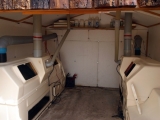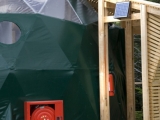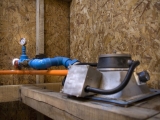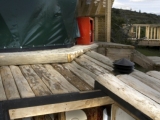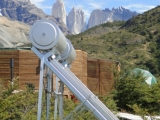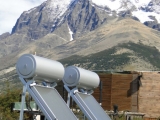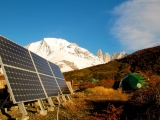EcoCamp’s Green commitment
EcoCamp Certification
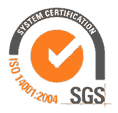 EcoCamp has been certified as an ISO14001 property, complying with high environmental standards and constantly testing and sharing new, innovative green ideas in an attempt to set the bar for other tourism developers. To date Ecocamp is the only lodge or hotel in Chile and Patagonia to have received such recognition.
EcoCamp has been certified as an ISO14001 property, complying with high environmental standards and constantly testing and sharing new, innovative green ideas in an attempt to set the bar for other tourism developers. To date Ecocamp is the only lodge or hotel in Chile and Patagonia to have received such recognition.
EcoCamp has also been ISO9001 certified, ensuring the highest standards of management principles are met.
In 2009 EcoCamp Patagonia was highly commended in Virgin holidays’ Responsible Tourism Awards, stating that EcoCamp sits ‘at the cutting edge of environmental practice with the design and creation of their innovative 4* Geodesic dome tented hotel…’
Carbon Free
 In the year 2008, Ecocamp became a Carbon Neutral company. Ecocamp’s goal is to minimize emissions of CO2 as much as possible and in the future hopefully become a CO2-free lodge. Between June 2009 and June 2010 Ecocamp offset 183.680 tonnes of CO2 emissions and between July 1st 2010 and June 30th 2011 it offset 229.402 tonnes.
In the year 2008, Ecocamp became a Carbon Neutral company. Ecocamp’s goal is to minimize emissions of CO2 as much as possible and in the future hopefully become a CO2-free lodge. Between June 2009 and June 2010 Ecocamp offset 183.680 tonnes of CO2 emissions and between July 1st 2010 and June 30th 2011 it offset 229.402 tonnes.
Ecocamp avoids transport pollution by buying all of food from nearby farm suppliers and greenhouses who have only to drive a few hours to deliver supplies, as opposed to other hotels who receive deliveries on flights from the capital or abroad. Also, all handicrafts and decorations and some furniture are made by local artists who, again, have limited transport requirements
Green Energy
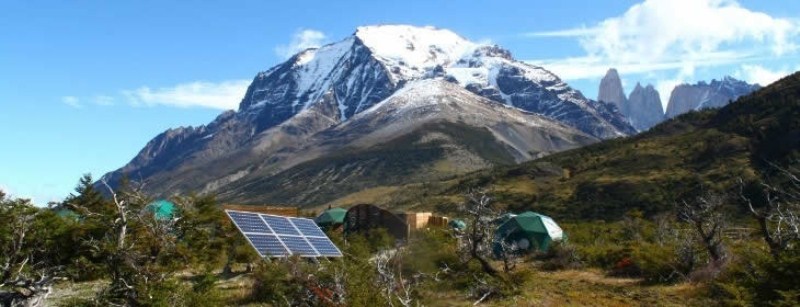
All of the electricity (which is very little as most of the efforts go to efficiency and electricity saving) comes from a micro-hydro turbine and photovoltaic panels. Energy is gathered together in a 24V battery bank to power all of EcoCamp’s refrigerators, lighting, electrical appliances, stereos etc. Propane gas is only used to heat water and superior domes. A pilot scheme to heat shower water with solar energy is in motion.
Water from the river enters the micro-hydro turbine at 5 litres per second with a net pressure of 38 meters delivering a steady power of 800 Watts. An inverter is used to switch from the 24V DC in the battery bank to 220 AC, the standard voltage in Chile. An array of 1700 Watt photovoltaic panels – also connected to the battery bank – collect the extra energy needed at Ecocamp.
Electricity is limited and only available to guests for charging camera batteries and laptops, not using hairdryers or electric razors. Solar energy is very efficient in summer when Patagonia receives up to 17 hours of sunlight daily.
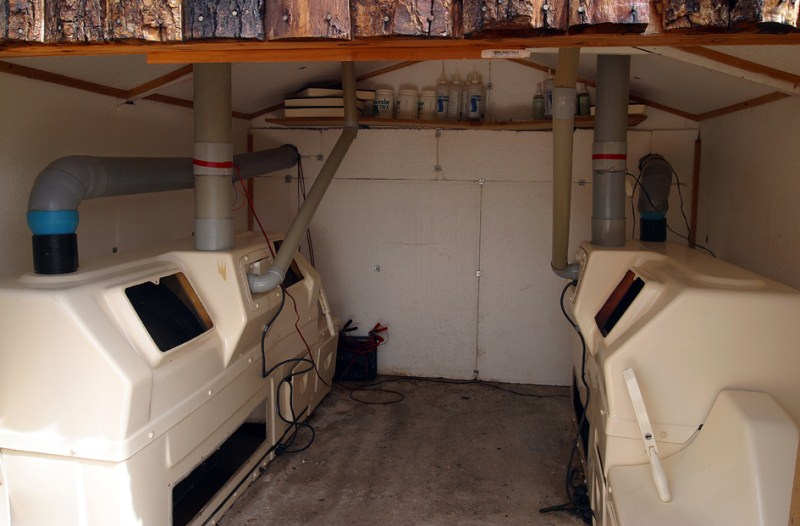
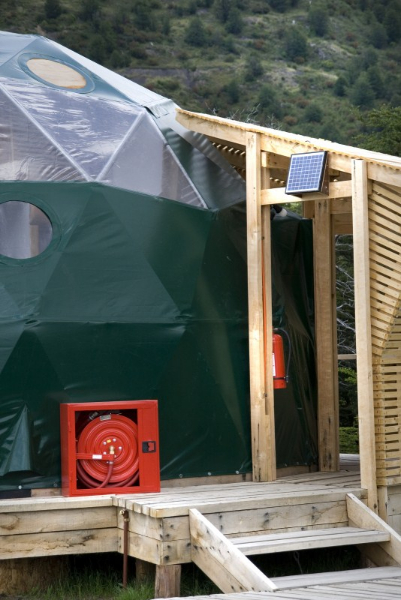
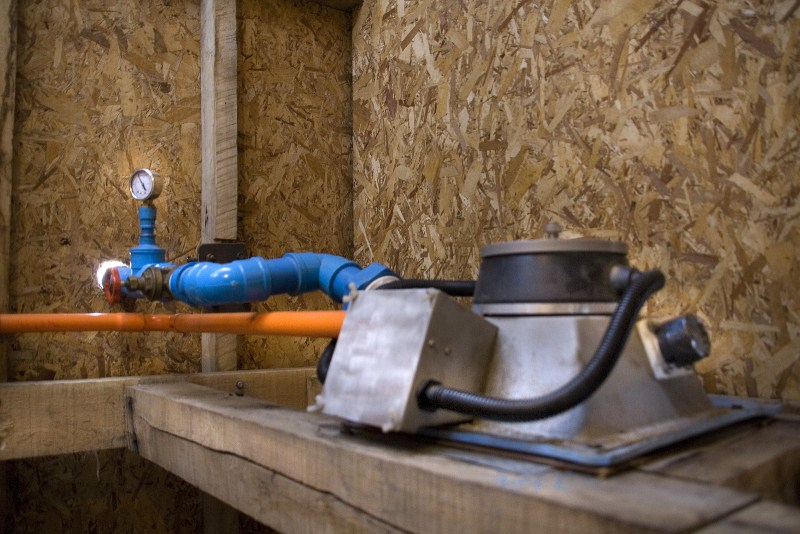
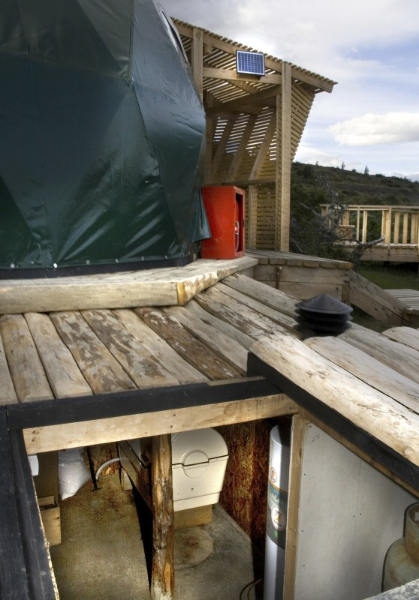
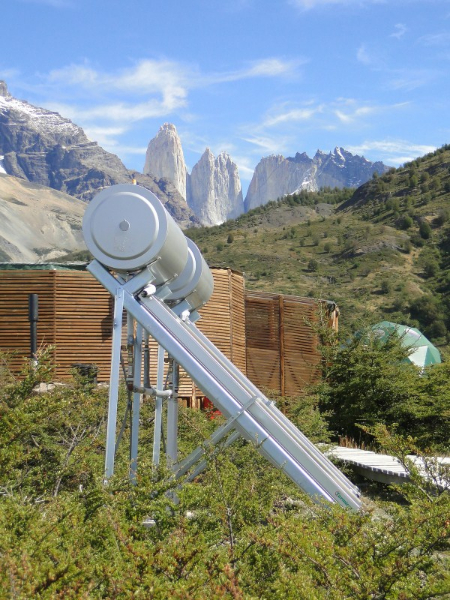
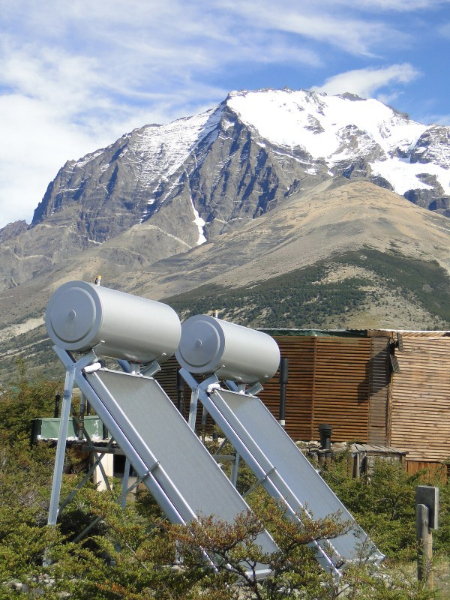
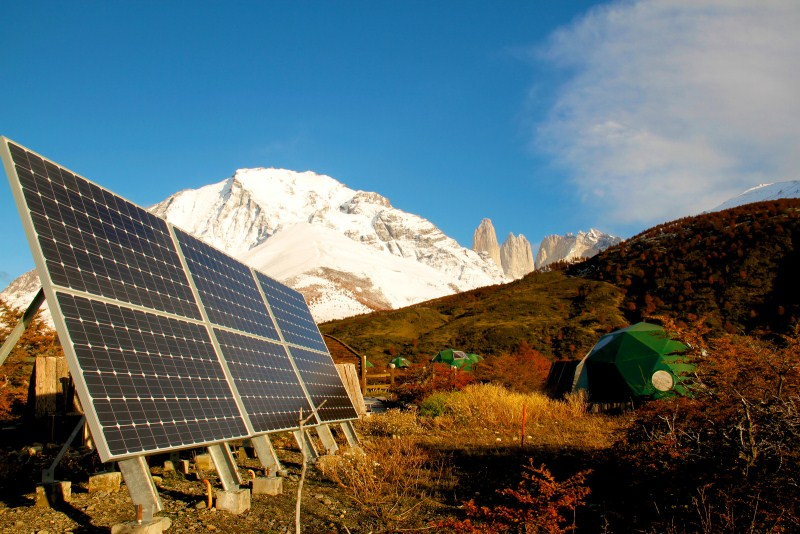
Domes have skylight windows so natural light and heat can be utilized. This not only allows guests to follow natural light patterns but saves electricity, leaving us confident that renewable energy sources are sufficient and fossil fuels are not needed. Suite domes have a wood stove for warmth, recycling dead wood from the park and avoiding the need to use diesel.
EcoCamp’s Responsible Tourism Policy
1.Create and provide an innovative, high-quality experience for each individual during their trip
At Ecocamp, the focus is on the whole experience. It wants travellers to enjoy every moment of their trip, and feel both relaxed and energised by each activity. Ecocamp trips are unique, eco-friendly and carefully designed to ensure maximum enjoyment and positive experiences. Staying at Ecocamp is an opportunity for guests to switch off from their normal lives, connect with nature, get to know a new place, and feel refreshed afterwards. Ecocamp chooses all suppliers extremely carefully, ensuring they meet with all standards and expectations so that guests are comfortable all the way through their Patagonia experience, from being picked up at the airport to chatting with their guide on the mountainside.
2. Develop and promote environmentally-friendly tourism, which is 100% sustainable wherever possible
Ecocamp carefully selects providers and fellow tour operators based on their environmentally-sustainable policies. EcoCamp works to become fully sustainable. constantly studying, testing, purchasing and installing sustainable technologies for renewal energy supply, insulation and waste management. The Environmental Management System at the Ecocamp Patagonia has been certified under ISO14.001 by a third party. This is the only lodge or hotel to date in Chile and Patagonia that has received such recognition.
In the year 2008, Ecocamp Patagonia became a Carbon Neutral company. Ecocamp’s goal is to minimize emissions of CO2 as much as possible and in the future hopefully be a CO2-free lodge. Between June 2009 and June 2010 Ecocamp offset 183.68 tons of CO2 emissions. Ecocamp is one of just two hotels in Torres del Paine not using generators to produce electricity, and using gas for refrigeration and heating.
Ecocamp has a basic policy of environmentally-sensitive management of waste which includes bringing as little paper, tin and plastic into the wilderness as possible. All waste brought in is stored according to its recycling status, whether plastic, glass, organic matter, paper or batteries. Organic waste is feasted on by the pigs at neighbouring farm, and other waste sent to Punta Arenas for recycling. Ecocamp obtains energy from 100% natural and renewable sources.
40% of energy is solar – in summer Patagonia receives 17 hours of daylight- and 60% hydro-electric. Only propane gas is used to heat water. EcoCamp has composting chambers which collect waste from toilets. Solid waste remains in the chamber, mixed with paper and wood chips, and is heated to keep microorganisms alive and the compost process active. Liquids are passed through a cleaning chamber, filtered, then passed into the ground. To date this is the only composting unit used in Patagonia, where low temperatures mean great effort is required to maintain the active process.
3. Support nature conservation and the preservation of flora and fauna
Ecocamp respects all flora and fauna and foster an understanding of nature’s importance among neighbours by sharing all innovations with the local Corporacion Fomento & Producción (CORFO), so they can help other entrepreneurs follow the same path. The focus is on developing successful, concrete examples that can be imitated by other developers. By doing this, Ecocamp promotes the building of portable lodgings that don’t have a huge impact on the terrain in Chilean National Parks and don’t disrupt the flora or fauna.
EcoCamp’s design was inspired by the traditional Kawesqar (the ancient inhabitants) hut resembling an igloo and a dome at the same time, designed to conserve natural energy and heat. Between the low-impact design of the domes, the use of composting toilets, micro hydro power, wind power, recycling, the minimization of garbage and wastes, Ecocamp leaves no trace in the park. Since the EcoCamp is built inside a National Park and wood from native forests isn’t meant to be touched, it was decided to build the structures outside the park, with materials such as galvanized iron, canvas, and pine wood.
All constructions at EcoCamp are built over raised platforms that allow wild animals to pass underneath the structures. There are no fences surrounding the EcoCamp, so horses can come in freely to graze in the mornings. Solar lamps light the walkways and domes at night. They are very subtle so as to not disturb night animals. Through the years Ecocamp has witnessed several wild animal sightings close to EcoCamp, including pumas. This is welcomed proof that animals have not felt threatened by Ecocamp, nor has there been any disruption to their natural environment or surroundings.
4. Ensure excellent working conditions for all staff at EcoCamp, enabling their personal and professional development
EcoCamp’s parent company (Cascada Expediciones) employs approximately 25 people in its Santiago office all year round – working in sales, marketing, traffic, operations and accounting – in addition to staff in Patagonia at Ecocamp. The personnel at EcoCamp in the 2010-2011 season consisted of 39 employees: 5 people working in Punta Arenas and at the Puerto Natales office (two of Torres del Paine’s closest cities), 16 people attending to guests at the camp, 6 drivers and 12 experienced guides. 90% of the staff are native to Patagonia or long-term residents in Puerto Natales or Punta Arenas.
All EcoCamp staff live an eco-friendly life, taking care of energy, water and waste management. Staff share the environmentally-sustainable philosophy put into practice over the last twenty years by the Cascada, and encourage guests, suppliers and shareholders to think and act alike.
Waste Management
Ecocamp has a basic policy of environmentally-sensitive waste management which includes bringing as little paper, tin and plastic into the wilderness as possible. All waste brought in is separated at the source and stored according to its recycling status: organic, paper, glass, and dangerous or toxic materials. All non-organic materials are removed and sent to the closest town of Punta Arenas to be recycled or disposed of and organic material is fed to a neighbouring pig farm.
Guides ensure guests leave no rubbish en route during treks, and that all non-biodegradable material is brought back to EcoCamp to be properly disposed of. Guests reuse zip-lock lunch bags and water flasks.
Ecocamp chooses all suppliers extremely carefully, ensuring they are all aware of and meet environmental standards. Everything is bought in bulk so as to limit individual packaging and suppliers limit packaging brought into the park to an absolute minimum.
Guests recycle their lunch bags everyday and use the same flask which they re-fill with water en route during their trek. Ecocamp offers a traveller handbook in all domes informing guests of ecological practices and their responsibilities while in the park, which include staying on the raised wooden walkways, never smoking inside domes, using biodegradable hygiene products, always returning waste to the recycling point at EcoCamp, taking batteries back home, minimising time in the shower and sharing transport to and from EcoCamp.
EcoCamp has the world’s southern-most composting device, and the first in the hotel industry in the whole of Chile and Patagonia. Composting chambers collect waste from toilets and solid waste remains in the chamber, mixed with paper and wood chips, and is heated to keep microorganisms alive and the compost process active. Liquids are passed through a cleaning chamber, filtered, then passed into the ground. Due to the low temperatures in Patagonia, great effort is required to maintain the active process.

